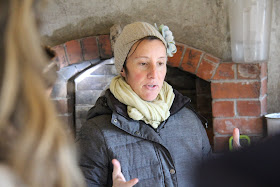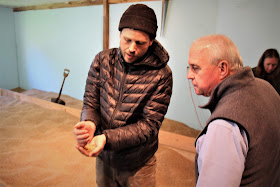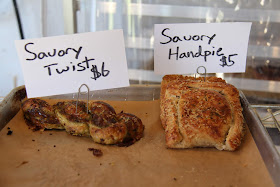Communications
 |
| Sage Dilts talks about her baking philosophy with WSDA Director Derek Sandison in front of the Barn Owl Bakery's wood fired oven. Dilts won a NASDA Foundation contest for women in agriculture. |
“That’s when you start salivating,” she says.
Walk into her tiny Lopez Island bakery and you’ll see what she means. The rich aroma of her craft bread, fresh out of the wood-fired oven, is sure to make your mouth water.
Wild Starter
Dilts says the yeast and bacteria in her wild leaven (or sourdough starter) provide the complex flavors that make the bread taste so good, and they also help break down parts of the grains that can be hard to digest, allowing the body to better absorb the nutrients.
 |
| WSDA Director Derek Sandison followed through on his promise to visit Dilts' Lopez Island bakery after she won a NASDA Foundation award in February. |
In the 200-square-foot bakery she and her husband Nathan Hodges built in 2012, she has established a thriving niche market on the islands with baked goods made in ways she believes are healthy for the body and the planet.
Farm to Food Competition
This year, Dilts won the National Association of State Departments of Agriculture (NASDA) Foundation’s Women’s Farm to Food Competition. The contest is dedicated to fostering growth among women producers (i.e., farmers, fishers, ranchers) and women entrepreneurs with food and beverage businesses in Oregon and Washington.
 |
| Sage Dilts started baking bread on Lopez Island 8 years ago. Now it's time to expand the Barn Owl Bakery. |
When competitors presented their business plans at NASDA’s Winter Policy Conference in Washington DC in February, WSDA Director Derek Sandison presented Dilts the $20,000 Grand Prize and promised to visit to the Barn Owl Bakery.
 |
| Barn Owl Bakery employee Ona Blue tends to the wood-fired oven and some of the locally-grown ingredients. |
Sandison said this type of competition and the awards are important because they help promote diversity in agriculture.
“We are trying to encourage women to enter agriculture and for them to thrive once they are in it,” Sandison said.
A big challenge
“Particularly for small-scale operations, you have to develop your own markets,” Sandison said. “It’s not just that you have to grow or produce something, but you then have to find a way to market that product.”
Moving to the country
 |
| Sage Dilts bakes with locally grown and milled grain. She recently won the National Association of State Departments of Agriculture (NASDA) Foundation’s Women’s Farm to Food Competition |
Dilts makes her bread by hand from scratch using no commercial yeast or chemical leavening. Instead she maintains and relies on a wild leaven, rich with bacteria and yeasts, to impart flavor and nutrition to her breads and pastries.
A world of wheat varieties
Hodges, her husband, zealously experiments with heirloom grains trying to identify varieties that grow well in the area and taste good in the bread.
“There’s all these crazy flavors,” Hodges said. “It takes three or four years for us to get enough seed to mill up to actually taste the grain. So there’s always that moment where it’s like, what’s this one going to be? Sometimes it’s not that interesting but other times it’s really wild!”
 |
| Nathan Hodges shows Sandison a sample of the grain he is drying at Barn Owl Bakery's granary. |
In the past four years he had planted more than 50 varieties in search of a seed like the Ethiopian Blue Tinge emmer wheat, for example. His crop notes describe it as grain that threshes easily with an intriguing dark purple seed that makes a dough that darkens to the color of chocolate.
“In our baking trials, this is always a crowd favorite for taste,” he notes.
Hodges and Dilts hope to cultivate the connection between food and the land as part of their business model.
“Modern wheats tend to be ill-suited to our form of agriculture here,” he said. “We don’t water our wheats, we don’t fertilize our wheats, and our soils are relatively poor. But the older wheats, like the Landrace varieties, are perfectly suited to that form of agriculture because that’s the way they were grown for thousands of years.”
 |
| Locals pick out hand-made baked goods themselves and pay on the honor system. |
The Barn Owl Bakery’s business model may not be suited to other bakeries. They run a bakery with no counter help and customers pick out their own purchases and pay on the honor system in an open bowl on the baking rack.
But on this low-key, high-minded island, it seems to be working.
In fact, the bakery is expanding. Dilts can make 25 loaves an hour in her Allan Scott style wood-fired oven, but even with 13 hours of baking a day, that’s not enough bread to keep up with demand.
With the prize money from the NASDA Foundation competition, she is upgrading to a Bassanina wood-burning deck oven that will allow her to quadruple output.
“We really needed to expand to make this work for us as a family,” Dilts said.
